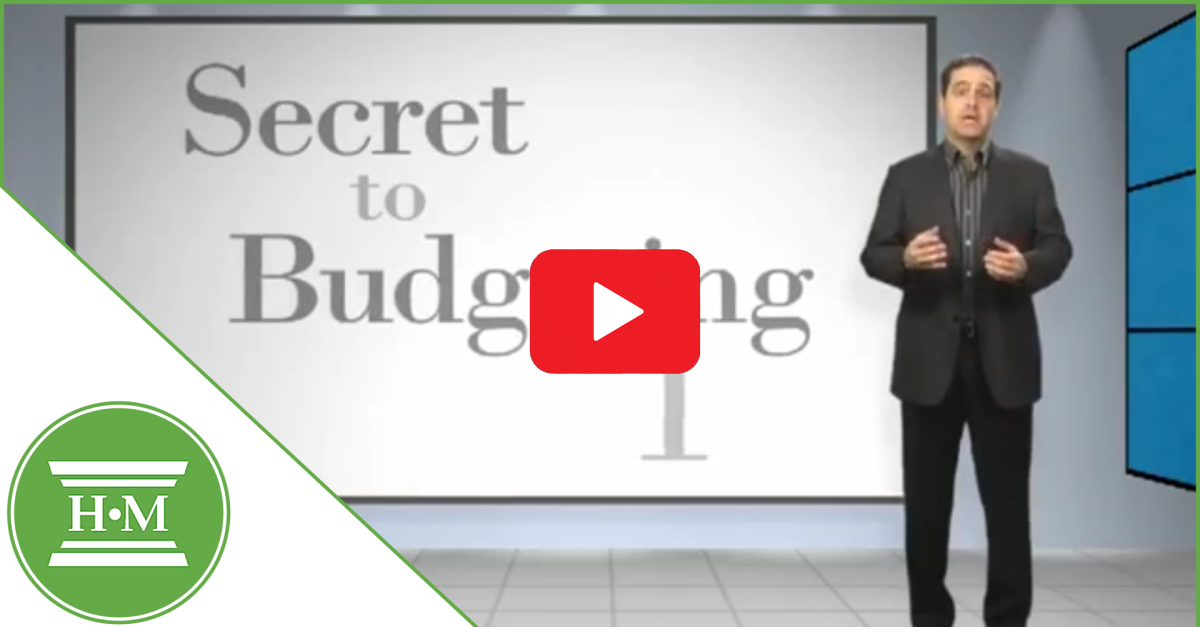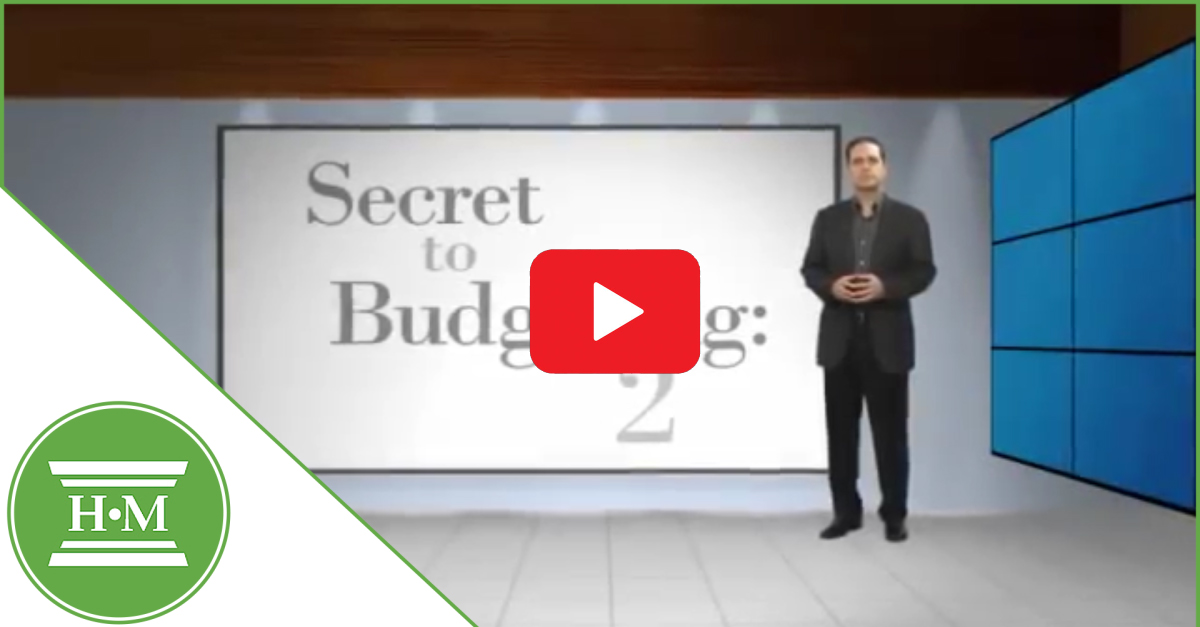Whether you are looking to get out of debt, or stay out of debt, a good approach to budgeting can help. But you need to find the right budgeting method that works for you.
Here at Hoyes, Michalos we recommend two different approaches to budget your way to a debt free life.
The first is our free excel budget spreadsheet. This is a great approach if you are comfortable tracking your income and expenses regularly and are looking for ways to change your spending patterns so you can save more money or pay down debt.
The second budgeting method is our ‘No Budget’ budget. We get it. Most people don’t like to budget or give up after a few weeks or months because frankly, budgeting is hard and not very enjoyable. But you still need to find a way to be sure you are living within your means and achieving your financial goals. Licensed Insolvency Trustee Doug Hoyes explains how you can do that without budgeting.
No matter how you budget, there are a lot of benefits that can be achieved from having a more disciplined approach to managing your money.
Benefits of Budgeting
- Become aware of your entire financial situation
- Get a solid grasp on your earnings and expenses
- See exactly where you spend your money
- Identify any problem areas
- Make the changes to improve your financial situation
So, pick your budgeting system of choice, and make a plan to be debt free.
Traditional Excel Budgeting Spreadsheet
Budgeting when you are broke, living paycheque to paycheque, or carrying a lot of debt isn’t just about expense control. You need to find meaningful changes that can balance your budget. That’s what step-by-step budgeting with an excel spreadsheet accomplishes.
Step 1. Record your income and expenses
The first tab in our budgeting workbook is a 30-day spending plan. Begin by recording your income and expenses on the Current Spending tab of our budgeting worksheet. For recurring expenses like rent, insurance, loan payments, your cable or phone bill, pull out copies of your credit card statements, utility bills and bank statements for the past year.
Once you’ve recorded everything, take a look at how much income or money you have remaining at the end of the month right now (line 99).
Don’t worry if your cash flow is negative at this point, you’ll bring your budget into balance in the next step. Starting with a realistic picture is important because it explains why you may find your debt balances growing or why you can’t save money.
Step 2: Balance your budget
Now you need to adjust your budget and bring it into balance which means budgeting to zero. This might seem odd but zero-based budgeting means that you allocate every dollar you earn to a purpose. If you have money left over at the end of the month, decide where it should go – savings or debt reduction. If you don’t have enough, you need to find ways to cut back on expenses or earn more.
Using the Changes column on the Your Budget tab, review your expenses line by line. Are there discretionary expenses, or wants, you can cut back? Our spreadsheet features some useful spending ratios to give you an idea of how much you should be spending on each main category like housing, transportation and personal expenses.
Put as much as you think you can afford towards debt repayment, and if debt reduction is not your goal, towards savings.
The goal is to have row 99 on the Your Budget tab equal to zero. Once you do, congratulations, you’ve brought your budget into balance.
Step 3: Set actionable goals for debt reduction or savings
Many personal finance experts start with goal setting when doing a budget. The problem with this approach is you don’t know what you can realistically achieve. Deciding to pay $150 a month extra towards your credit card debt or putting $35 a week into an emergency fund is terrific if you have the cash flow. But overreaching is one of the main reasons why budgets fail.
This is why we suggest you make specific, measurable, actionable, realistic, trackable goals – SMART goals – after you have figured out how to balance your budget to zero.
Convert the changes you’ve committed to into actionable steps in the Goals tab. If you committed to reducing your entertainment costs by $100, write down exactly how you are going to do that.
Remember, these are your goals and it’s your budget. If you want to buy coffee on the way to work & that fits in your budget then go ahead. You get to decide how you are going to adjust your lifestyle choices to reach your savings or debt reduction objectives.
If you are making a budget as part of a debt reduction plan to help you get out of debt, you can also download our debt repayment worksheet to help you set debt repayment targets.
If you find that even on a budget you can’t seem to successfully manage your debts, then we’re here to help. Ask us how which debt relief options can help you become debt free if budgeting isn’t enough.
Step 4: Track your progress
You’ve set your budget but success is all about implementation. To ensure you can meet your debt reduction or savings goals, it’s a good idea to keep track of your actual spending against your budget each month. There are plenty of apps that can help you do that but sometimes a simple spreadsheet is best because, by putting everything down in writing, you are aware of where and why you may have gone offside.
Track your actual income and expenses each month using our Tracking tab. If you find yourself not meeting your goals, don’t worry. Revisit your budget and adjust. Don’t give up. If you give up on your budget, then your situation will never get any better.
The ‘No Budget’ Budget
Don’t like the idea of tracking your spending on a spreadsheet every month? No problem. You can still stay on top of paying your bills and meet your debt reduction or savings goals by following a set of principles and practices that don’t involve writing everything down on a spreadsheet or using a complicated budgeting app.
Part 1: Match your payments to your paycheque
The first step to staying on top of your finances is to pay your bills as frequently as you get paid.

If you get paid every week, then pay your bills every week. Let’s say your hydro bill is $200 a month. Instead of waiting until the bill is due, you send the hydro company $50 every week on payday. By the end of the month, you’ll have sent them $200 and you don’t risk running short of funds and missing a payment.
The trick with this approach is to automate what you can. Set up recurring payments and savings to automatically happen weekly, bi-weekly or monthly.
Part 2: Set up a separate PLAN account
Paying your bills every week is easy if you can pay your bills online, but what about bills you can’t pay on line? You probably pay your rent by giving your landlord post-dated cheques each month. Your landlord probably doesn’t want a cheque every week, because it’s a lot more work for them to deposit a cheque each week. And what about expenses like your car insurance or holidays that come up once a year?
The secret to paying monthly bills is The PLAN account.

Plan stands for:
- Projected expenses like your monthly rent or car insurance
- Layaway money for regular and expected costs like car repairs, clothes and gifts
- Annual costs like Christmas, birthdays, vacations, annual renewals
- Needs and emergencies that might crop up.
Open a second bank account for your planned payments. Deposit enough money each payday in your PLAN account to make sure you have enough set aside to cover these expenses when they arise.
And you can use this account, or a separate account, to automate your savings as well. It’s like a version of having jars or envelopes, but just separate bank accounts for future bills.
To know how much to set aside, we still recommend doing a 30-day budget. You can use the first tab on our excel spreadsheet or just make a list.
Once you ensure that your bills are paid and that you are putting enough in your PLAN account every paycheque to cover future expenses, whatever is left over is yours to spend however you want.
Whichever system you use though,
- Be completely honest with yourself
- Make a plan and stick with it
- Be willing to make changes to accomplish your debt free life goals



